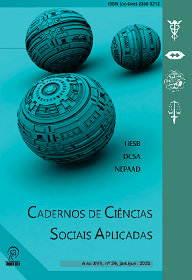The evolution of the concept of work and its relation with economic development
DOI:
https://doi.org/10.22481/ccsa.v17i29.6647Keywords:
Desenvolvimento socioeconômico, História, TrabalhoAbstract
This article aims to analyze historically the relations of the labor category with economic development, its transition from slave to wage labor and the evolution of its concept. To this end, a bibliographical study was conducted, which describes the conceptual aspects of the work from the Marxist prism. The research starts from the premise that the productive capacity of society is allied to the use of labor as a commodity and that the bourgeois class produces wealth via the exploitation of the worker. Investment in the worker does not accompany the process of incorporating technological progress into machinery and equipment, and this promotes a structural imbalance in society. The accumulation of wealth was primarily by the nobility and clergy, and now by a capitalist bourgeois class. Society and the state must strive to produce a less fragmented labor market, with the amplification of wage relations, subject to social protection and the homogenization of working conditions. It considers that one of the main factors for effective development is job creation, with remuneration that allows the maintenance of essential conditions for life.






